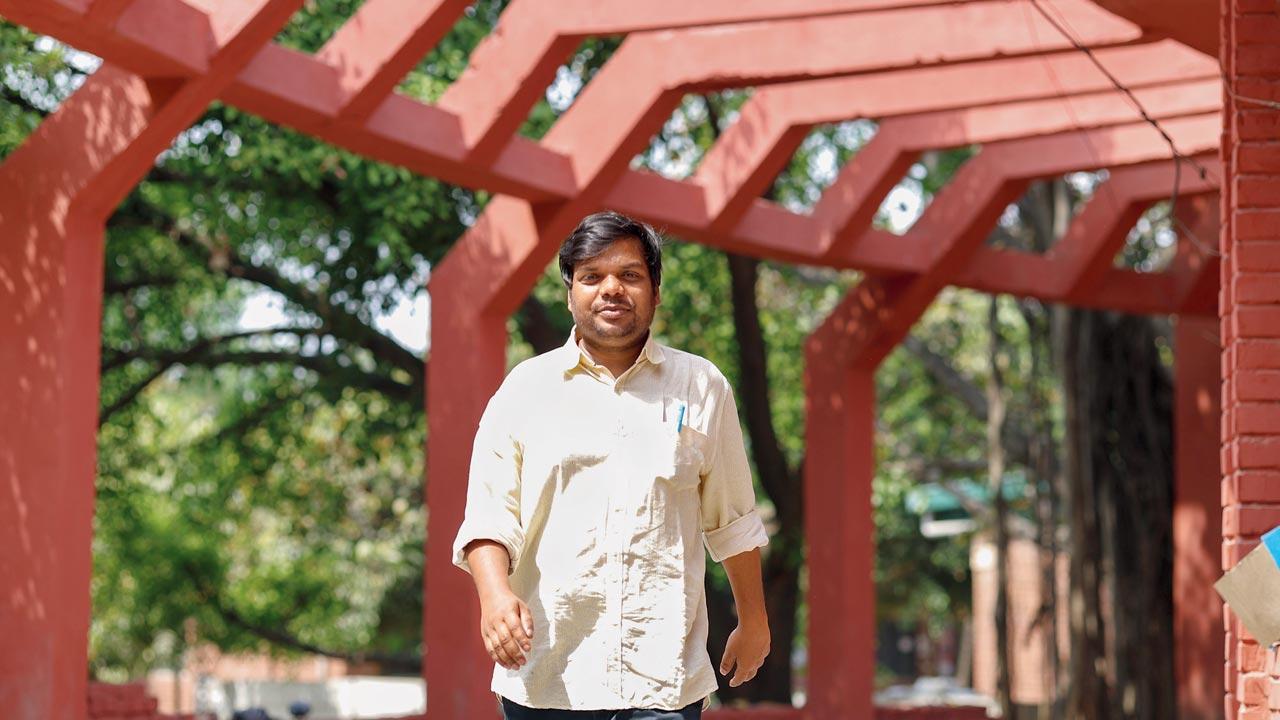Dhananjay, the first Dalit president of the university’s student body in 30 years, says the challenges that await him on campus include a movie that could endanger students’ lives

Dhananjay won the Jawaharlal National University (JNU) student body elections that were held on the campus last week. Pic/Nishad Alam
Not just the polls itself—which had been in limbo since COVID-19 —but the Jawaharlal Nehru University (JNU) student election this year was historic in more than just one way. The other milestone is that the All India Students’ Association (AISA) backed a Dalit candidate, Dhananjay—who omits his last name to duck caste-based bias— and broke a 30-year jinx of under-representation of the community.
ADVERTISEMENT
JNU’s history of dissent has earned it the reputation of being the bastion of Left Wing ideologies. In recent times, this was most evident when the Citizen Amendment Act (CAA) was first announced in December 2019. Protests erupted on the campus and climaxed in a face-off between the students and Delhi police and the arrest of student-activists Sharjeel Imam and Umar Khalid under charges of sedition.
This week, mid-day spoke with the PhD student from Gaya, Bihar, who was elected President of JNU’s student body, about the inroads made by the Akhil Bharatiya Vidyarthi Parishad (ABVP), and the atmosphere of polarisation on campus. His win has been by no slim margin: Dhananjay secured 2,598 of 4,274 votes, numbers the university has never seen before.
On the horizon looms a new movie called Jehangir National University, set to release on April 4. The Student’s Federation of India (SFI) recently asked JNU vice-chancellor Santishree D Pandit to ban the screening on campus as it portrays students as anti-national elements.
Excerpts from the interview.
Has the AVBP been able to gain serious ground on campus? It seems more visible and vocal, having organised multiple gatherings. Its membership is also said to have grown over the last four years.
We haven’t lost ground, but there has been a rise in Right wing sentiments. Then again, that’s true all over the country. However, there is always room for debate and discussions on this campus. No one can and would run away from a debate at JNU; that’s just the way we are primed to behave in the university. We understand that the Right wing is trying to show its influence, like it does in Delhi University, by using money muscle. But in JNU, you have to engage in debate, and you have to win.
Have you found common ground with students from opposing ideology?
A student looks at the world around them from the perspective of welfare: Who is making the most noise to ensure reservations for those who need it? Has it been implemented? Does the mess have hygienic food? Are hostels maintained well? They see us with placards outside the administrative offices and know that we are fighting for them too. They cannot ignore us, despite opposing ideologies.
How has ABVP increased its vote bank then?
Word about our agenda was spread in the mess through pamphlets; this was our campaign which the ABVP mimicked. However, they failed at messaging, given the number of people who voted for them. People want security with the basics—food, education, and employment, which is what we focussed on.
They spoke about Pakistan being the enemy, and the cultural significance of the Ram Mandir. They continued the usual trope of polarisation on campus but it didn’t work because people here are academics and thinkers. They are studied in their approach and tempered in reactions—it might work for a few people, but most academics see through this.
As a Dalit representative, what are your concerns?
I understand more than others what Dalit students who enter these hallowed gates for education, face, but JNU as a whole, is facing unprecedented cuts in funding that is critical to maintain our infrastructure. AISA [All India Students’ Association; a left wing student organisation] and SFI [The Students’ Federation of India] allege that funding for the library has been cut to R1.7 crore from R8 crore. So, it is no longer a Dalit issue: If a [crucial text] book is not available for one student, it is not available to anyone.
Recently, the admission process for the Masters programme was made so complicated that almost 50 per cent of tribal students could not appear for the entrance exams [as those for different disciplines were held on the same day]. Similarly, the number of female students has gone down from 51.5 per cent to 37.5 per cent in five years. Anti-welfare decisions like the cancellation of the Maulana Azad Fellowship [for Junior Research and for those who want to pursue courses under the University Grants Commission (UGC)] also affect the number of Muslims present in academia. The majoritarian powers do not want Muslims to have a presence in research, or pursue a doctorate.
Has the ABVP been on the offensive?
They have been able to make some inroads, but only with tactics such as assuring jobs or admission into doctorate programmes in exchange for votes. [But] This will only take them from 10 votes to 100.
My mother does puja every day, but she isn’t communal, and this is what the AVBP doesn’t understand—that there is difference between religious and communal. The challenge will be [to tackle] the attack on us via policy and propaganda. Films are being circulated that encourage violence against JNU students. If a student is shot, will the government do anything? This is our big challenge: The safety of JNU students is at risk.
 Subscribe today by clicking the link and stay updated with the latest news!" Click here!
Subscribe today by clicking the link and stay updated with the latest news!" Click here!







